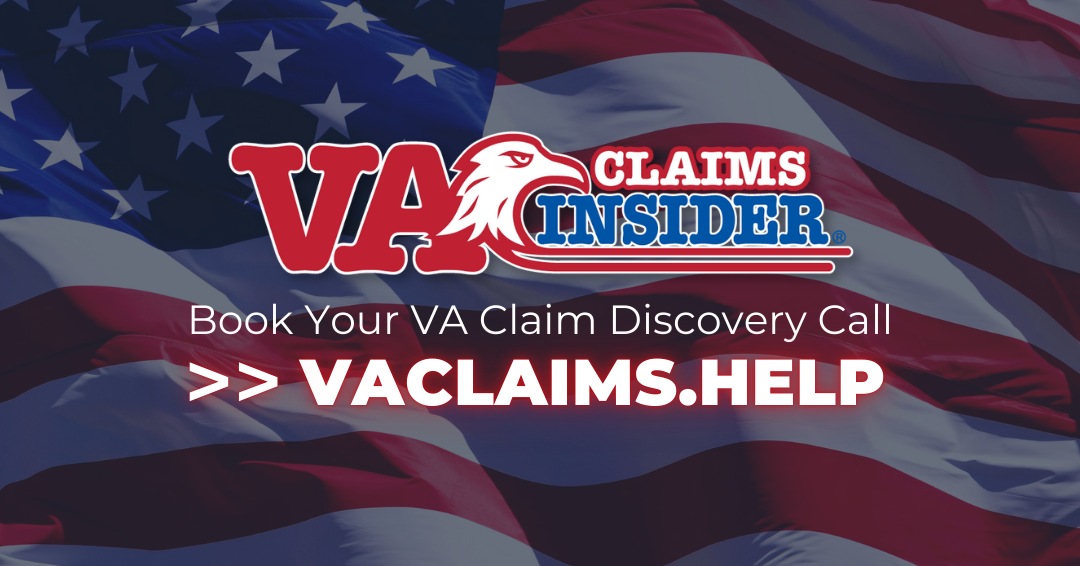Looking for Expert-Level VA Claim Answers?📱Call Us Now! 737-295-2226
In our experience, many veterans struggle to prove that their sleep apnea is connected to their military service.
Unfortunately, countless claims are denied due to the lack of a clear “nexus” — the link between sleep apnea and active duty service.
In fact, sleep apnea consistently ranks as one of the most denied VA disability claims.
But here’s the good news: even if your VA claim for sleep apnea has been denied before, you still have multiple options for an approval.
In this high-value blog post, VA disability expert Brian Reese reveals expert tips and strategies to get service connected for sleep apnea.
Pro Tip: The upcoming 2025 VA rating changes for sleep apnea introduce stricter guidelines that could significantly reduce disability compensation for many veterans. The most notable shift is the removal of the automatic 50% rating for veterans using a CPAP or similar device, replaced with a likely 10% rating for sleep apnea with incomplete relief, even with treatment. Additionally, the 30% rating category has been eliminated entirely. Veterans with severe sleep apnea may still qualify for a 50% or 100% rating, but only if their condition shows ineffective treatment or leads to serious complications like end-organ damage.
Table of Contents
Summary of Key Points
- Sleep Apnea and VA Claims Denials: Sleep apnea is one of the most denied VA claims. Many veterans struggle to prove a service connection for sleep apnea, resulting in frequent claim denials due to a lack of clear “nexus” evidence. However, even denied claims can often be successfully appealed with the right evidence.
- Service Connection for Sleep Apnea: Veterans can pursue direct or secondary service connection for sleep apnea. Veterans are typically more successful connecting sleep apnea secondary to an already service-connected condition, using a nexus letter to establish the link.
- VA Ratings for Sleep Apnea: VA disability ratings for sleep apnea range from 0% to 100%, with breaks at 30% and 50%, depending on the severity of symptoms and treatment required, such as the use of a CPAP machine or the presence of chronic respiratory failure.
- Appealing a Denied Claim: Veterans can strengthen their case through a Higher-Level Review (HLR) or Supplemental Claim with new evidence, such as a stronger nexus letter, Disability Benefits Questionnaire (DBQ), and documented lay evidence. Denials should be viewed as setbacks, not dead ends.
Fellow Veterans: Do You Want to WIN Your VA Disability Claim FASTER?
Are you in need of expert-level VA claim help? Call us right now: (281) 533–6777.
Hi veterans, I’m Brian Reese the VA Claims Insider, and I’m here to help you INCREASE your VA rating FASTER — even if you’ve already filed, been denied, gave up, or don’t know where to start…
If you’re frustrated, underrated, or simply sick and tired of fighting the VA alone, WE’VE GOT YOUR SIX!
Know this: There’s always another path available to you, regardless of past VA claim denials, and we’re committed to helping you achieve VA claim victory.
Our process starts with a one-on-one phone call so we can get to know your unique military service history and VA claim situation.
We’ll identify where you stand now, where you want to go, and how we can make it happen with the right medical evidence.
If we nail your VA claim strategy, the tactics become simple and easy!
Through this gap analysis process, we’ll build a personalized VA claim strategy tailored to your needs — designed to give you the best possible chance of securing the VA rating and compensation you’ve earned for serving our country.
>> Click HERE to book a date/time for your no-obligation consultation with a VA claim expert or call us right now at (281) 533–6777.
What is Sleep Apnea?
Sleep apnea is a serious condition where breathing repeatedly stops and starts during sleep.
This interruption can prevent the body from receiving adequate oxygen, leading to poor sleep quality and other health complications.
Three Types of Sleep Apnea:
- Obstructive Sleep Apnea (OSA): The most common type in veterans, caused by throat muscles relaxing and blocking the airway.
- Central Sleep Apnea: Occurs when the brain doesn’t send the right signals to the muscles controlling breathing.
- Complex (Mixed) Sleep Apnea: A combination of obstructive and central sleep apnea.
Symptoms of Sleep Apnea in Veterans
Common symptoms of sleep apnea in veterans include:
- Loud snoring
- Gasping for air or choking during sleep
- Pauses in breathing during sleep
- Daytime fatigue and excessive sleepiness (hypersomnolence)
- Headaches in the morning
- Difficulty concentrating or memory issues
- Irritability or mood swings
How Common is Sleep Apnea in Veterans?
Sleep apnea is very common in U.S. military veterans.
Veterans are between three and four times more likely to be diagnosed with sleep apnea than civilians who didn’t serve in the military.
It’s particularly common in veterans due to factors such as:
- High-stress environments during service
- Poor sleep conditions during training and deployments
- Increased exposure to respiratory irritants, such as burn pits
- Weight gain or obesity because of other service-connected disabilities or post-service lifestyle changes
- Side effects from medications taken to manage symptoms of current service-connected disabilities
- Co-existing conditions like PTSD, GERD, sinusitis, rhinitus, asthma, or deviated septum, among others
VA Disability Ratings for Sleep Apnea From 0% to 100%
The VA rates sleep apnea from 0% to 100% with breaks at 30% and 50%, under Diagnostic Code 6847 in 38 CFR § 4.97, schedule of ratings for the respiratory system.
The rating criteria are based on the severity of the condition and the treatment required:
100% VA Disability Rating for Sleep Apnea
Criteria: Chronic respiratory failure with carbon dioxide retention or cor pulmonale (right heart failure), or the need for a tracheostomy.
Explanation: This is for veterans with the most severe form of sleep apnea. If your condition leads to respiratory failure, heart issues, or requires a tracheostomy, you’ll qualify for the highest rating of 100%.
50% VA Disability Rating for Sleep Apnea
Criteria: Requires the use of a continuous positive airway pressure (CPAP) machine.
Explanation: Most veterans with sleep apnea who require a CPAP machine fall into this category. If you’ve been prescribed a CPAP to help manage your sleep apnea, you’re likely eligible for a 50% rating.
30% VA Disability Rating for Sleep Apnea
Criteria: Persistent daytime hypersomnolence (excessive daytime sleepiness).
Explanation: This rating is for veterans whose sleep apnea causes significant daytime sleepiness, but who don’t require a CPAP machine. If your sleep apnea disrupts your sleep to the point where it impacts your daily life, you may qualify for 30%.
0% VA Disability Rating for Sleep Apnea
Criteria: Asymptomatic but with documented sleep disorder breathing.
Explanation: This rating is for veterans who have documented sleep apnea but don’t experience symptoms severe enough to affect daily life or require a CPAP machine. A 0% rating means your condition is recognized as service-connected, but it doesn’t warrant compensation.
How to Get Service Connected for Sleep Apnea
There’s generally two ways to get service connected for sleep apnea: direct service connection and secondary service connection.
#1. Direct Service Connection
To prove direct service connection for sleep apnea, you’ll need:
- Evidence in your Service Treatment Records (STRs) showing symptoms or a diagnosis of sleep apnea during active duty.
- The medical diagnosis of sleep apnea must be confirmed by a sleep study while on active duty.
Unfortunately, most veterans don’t have this type of evidence, which makes direct service connection for sleep apnea very difficult to prove.
#2. Secondary Service Connection
This is the best path for most veterans.
To win a secondary claim, you must show that your sleep apnea is proximately due to, caused, or aggravated by a condition that’s already service-connected.
For example:
- PTSD: Chronic stress and hyperarousal disrupt sleep patterns, worsening sleep apnea.
- GERD: Acid reflux can obstruct airways and exacerbate apneic episodes.
- Sinusitis or Rhinitis: Nasal airway blockages can lead to obstructive sleep apnea.
- Weight Gain or Obesity: Often linked to service-connected joint pain, back pain, or mental health conditions.
To win a secondary VA claim for sleep apnea, you’ll need:
- Medical Diagnosis of Sleep Apnea: You must have sleep apnea diagnosed and confirmed by a sleep study. It’s helpful to have a current diagnoses within the past 12 months.
- Nexus Letter for Sleep Apnea: This is a medical opinion from a qualified private doctor explaining how your current service-connected condition caused or aggravated your sleep apnea. This is the #1 best way to win a secondary claim for sleep apnea.
Sleep Apnea Secondary VA Claims
Here are the Top 10 VA secondary conditions commonly linked to sleep apnea:
- Sleep Apnea secondary to Deviated Septum
- Sleep Apnea secondary to Medication Side Effects
Expert Tips and Strategies to Win Your Sleep Apnea VA Claim
#1. Get a Medical Diagnosis via a Sleep Study
Your first step is getting an official diagnosis of sleep apnea through a sleep study.
Without a sleep study, the VA will not consider your condition as “medically diagnosed.”
#2. Consider Secondary Service Connection for Sleep Apnea
If you weren’t diagnosed with sleep apnea during military service, focus on connecting your sleep apnea to an already service-connected condition.
Most veterans are better off pursuing secondary service connection for sleep apnea.
#3. Get a Disability Benefits Questionnaire (DBQ) for Sleep Apnea
A DBQ for sleep apnea completed by a private healthcare provider can help document your diagnosis and the severity of your symptoms.
Combine this DBQ with your Nexus Letter when submitting your claim to strengthen your case and make it “decision-ready” for VA rating purposes.
By using the DBQ/Nexus Letter combination for sleep apnea, it’s possible to get your sleep apnea claim approved without a C&P exam.
#4. Get a Nexus Letter for Sleep Apnea as a Secondary Condition
To prove secondary service connection for sleep apnea, you need “medical nexus evidence” connecting sleep apnea to an already service-connected condition rated at 0% or higher.
The best way to do this is by getting a strong nexus letter for sleep apnea as a secondary condition from a private healthcare provider.
#5. Document the Severity of Your Sleep Apnea Symptoms
Your VA rating for sleep apnea depends on the severity of your symptoms:
- If you require a CPAP machine, you may qualify for a 50% rating.
- If you experience chronic respiratory failure or cor pulmonale, you may qualify for a 100% rating.
Document your sleep apnea symptoms by writing a personal statement in support of a claim and submitting it with your claim.
#6. Use Lay Evidence to Fill In Gaps in Your Medical Records
Lay evidence, which means statements from your spouse, family, friends, or fellow service members can provide evidence of sleep apnea symptoms during or after service.
This is especially helpful if there are gaps in your medical records that need to be filled in.
For example, if your spouse observed you snoring loudly, gasping for air, or choking in your sleep, their testimony can strengthen your claim.
What If Your Sleep Apnea Claim Is Denied?
Don’t lose hope if your sleep apnea claim is initially denied — this is a common outcome for many veterans filing sleep apnea claims.
The good news is that a denial doesn’t mean the end of the road!
We’ve seen many denied sleep apnea claims overturned with a Higher Level Review (HLR) or Supplemental Claim.
Here’s how to improve your claim and increase your chances of success (after a sleep apnea claim VA denial):
#1. Request a Higher-Level Review (HLR) for Sleep Apnea
If your claim was denied despite having a strong nexus letter, you should request a Higher-Level Review (HLR).
During the HLR process, a senior VA rater will re-examine your claim for any errors or overlooked evidence.
This approach can be especially effective if you believe your claim was unfairly denied.
#2. File a Supplemental Claim for Sleep Apnea with New and Relevant Evidence Not Previously Considered
If you didn’t include a nexus letter with your initial sleep apnea claim, now is the time to get one!
A nexus letter from a qualified medical professional can provide the critical link between your sleep apnea and your military service (or a service-connected condition).
Submit this new evidence with your Supplemental Claim to give the VA new and relevant evidence to consider.
#3. Consider Obtaining a Second Nexus Letter for Sleep Apnea
If your initial nexus letter didn’t lead to approval, consider getting a second opinion from another private physician.
A more detailed or better-supported nexus letter can address gaps or weaknesses the VA cited in its denial.
This can also help to combat a bad C&P exam with a negative medical opinion for service connection of sleep apnea.
Thus, a second nexus letter can help tip the scales in your favor leading to a sleep apnea claim approval.
#4. Consider Submitting a Sleep Apnea Disability Benefits Questionnaire (DBQ)
A completed DBQ for sleep apnea, filled out by a private healthcare provider, can help document the diagnosis and severity of your symptoms and strengthen your claim.
Combine the DBQ with your nexus letter to create a stronger case when filing your Supplemental Claim.
Again, this is considered “new and relevant evidence” that the VA Rater must consider.
#5. Don’t Ever Give Up – A VA Claim Denial Is Just a Setback!
Remember, a denial doesn’t mean your sleep apnea claim is unwinnable.
It simply means more evidence or clarification is needed.
Use this as an opportunity to build a more compelling case and submit additional medical evidence to support your claim.
And don’t ever quit fighting for what you rightfully deserve!
Conclusion & Wrap-Up
While proving service connection for sleep apnea can be challenging, it’s not impossible.
By gathering the right medical evidence, focusing on secondary service connection, and leveraging expert strategies, you can win your VA claim for sleep apnea—even after a denial.
Remember, you don’t have to navigate this process alone.
If you need help with your sleep apnea VA claim, we’ve got your six!
Call us right now for expert guidance:📱737-295-2226
Want Expert-Level Help with Your VA Disability Claim? WE GOT YOUR SIX!
How does VA Claims Insider help veterans?
We make the confusing and frustrating VA claim process EASY through our 8-step proprietary system and one-on-one coaching; we’re the VA Claim EXPERTS you can trust, and YOU are never alone in this fight against the VA!
You’ll also receive VA disability expert Brian Reese’s SEM Method Blueprint—a proven formula that has helped over 25,000 veterans win their VA disability claims faster:
Strategy + Education + Medical Evidence = VA Rating and Compensation You Deserve FASTER!
Start today and unlock an exceptional level of service you deserve for serving our country:
➡️ You’ll hear from a VA Claim Expert over email within 15 minutes of signing up today.
➡️ You’ll hear from your Veteran Coach team within 24 hours of all inquiries during normal business days/hours.
➡️ Our terms are clear and simple: If we don’t win, you don’t pay. You have nothing to lose and everything to gain.
Click the red button below to start the process of winning your VA claim right now!
Veterans: Are You Ready to WIN, SERVICE-CONNECT, and INCREASE Your VA Rating FASTER? We Can Help!

- VA Claims Insider is the #1 most trusted name in VA disability claims.
- Work directly with a VA claims coach who can help lead you to VA claim victory.
- 25,000+ disabled veterans served in our membership programs since 2016.
- 30% average rating increase for veterans who complete our #1 rated Elite program.
- 4.7/5.0 average rating out of 5,500+ total reviews; over 4,500 5-star reviews.
About the Author

Brian Reese
Brian Reese is a world-renowned VA disability benefits expert and the #1 bestselling author of VA Claim Secrets and You Deserve It. Motivated by his own frustration with the VA claim process, Brian founded VA Claims Insider to help disabled veterans secure their VA disability compensation faster, regardless of their past struggles with the VA. Since 2013, he has positively impacted the lives of over 10 million military, veterans, and their families.
A former active-duty Air Force officer, Brian has extensive experience leading diverse teams in challenging international environments, including a combat tour in Afghanistan in 2011 supporting Operation ENDURING FREEDOM.
Brian is a Distinguished Graduate of Management from the United States Air Force Academy and earned his MBA from Oklahoma State University’s Spears School of Business, where he was a National Honor Scholar, ranking in the top 1% of his class.




